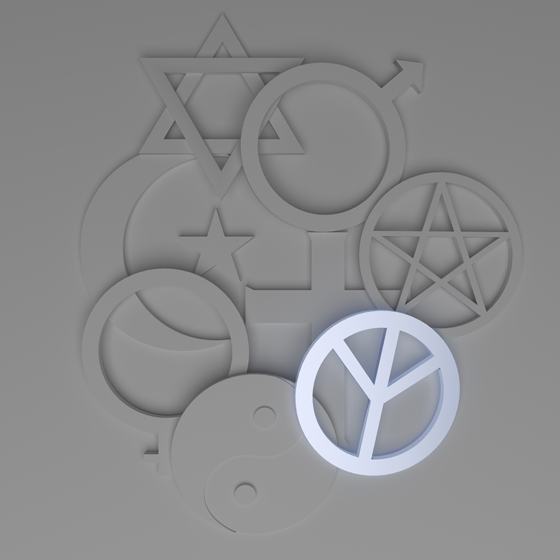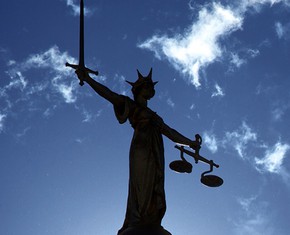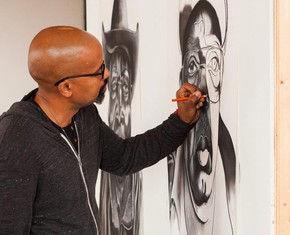The views expressed in our content reflect individual perspectives and do not represent the authoritative views of the Baha'i Faith.
At the time I first learned the fundamental tenets of the Baha’i Faith from my brother Bill, I was a member of a discrete group of students selected by the one really good teacher I had in high school, Grady Randolph. Mr. Randolph culled us out of his advanced classes, and he would periodically invite us to his elegant house for a sit-down dinner and a lengthy dialogue. The young men wore suits and ties, and the ladies wore their best dresses. He not only educated our minds, but also tried to impress upon us social skills and a sense of decency in every respect.
Most of the students in this group were among the brightest in our class, the acknowledged “intellectuals.” I presumed he chose me because I persistently asked challenging questions in class. I certainly did not consider myself an intellectual, nor do I think anyone else did either. But among the theories I first brought up after we formed our little discussion group—we called ourselves the “Inquirers”—was the Baha’i theory of progressive revelation in religious and secular history.
I wanted this theory discussed not to promulgate these ideas. At this point in my investigation of the Baha’i theory of everything, I had no vested interest in whether the theories were right or wrong. In fact, after my brother became a member of the Baha’i Faith and declined his fellowship to the seminary at Yale, I seriously tried to challenge his new views, though he wisely never once imposed his beliefs on me or even suggested that I should study them. He was a better teacher than that.
Anyhow, at one of our meetings of the Inquirers, we learned that a group advocating world peace and world unity was coming to town, a group called “Moral Rearmament.” They were giving open invitations for us to see this musical play about peace, which had great production values and fine singers and actors. After the play, one of them would team up with each of us at the performance. We would then go to a restaurant for a conversation in which they would try to convince us to join their movement.
MRA, as it was then known, had its beginning as a spinoff from the religiously-oriented Oxford Group begun in 1938. Another spinoff from the same Oxford Group: Alcoholics Anonymous. But at the heart of the MRA movement, its integrating principle, was the advocacy of global peace through moral reformation, one individual at a time. This reformation of moral character involved what they called the Four Absolutes: practicing absolute honesty, absolute purity, absolute unselfishness, and absolute love.
The group has since changed its name to Initiatives of Change and now funnels its funds and energies into supporting the work of the UN and other global agencies for peace and international cooperation. But at the time (1957), they went from city to city throughout the world performing this very moving play, a sort of modern morality play, and then invited those who attended to join, by having members separate the individual attendees, pair them with an MRA spokesperson, and give them the MRA pitch.
 My MRA “teacher” was a very amicable English gentleman with whom I had a lengthy and valuable dialogue, valuable to me primarily because the group shared the Baha’i goals of world peace and world cooperation through moral transformation of the citizens of the world; and the abolition of prejudice and the establishment of racial unity. In effect, here was an opportunity for me to test the Baha’i theory of reality and proposed solutions to world problems.
My MRA “teacher” was a very amicable English gentleman with whom I had a lengthy and valuable dialogue, valuable to me primarily because the group shared the Baha’i goals of world peace and world cooperation through moral transformation of the citizens of the world; and the abolition of prejudice and the establishment of racial unity. In effect, here was an opportunity for me to test the Baha’i theory of reality and proposed solutions to world problems.
I asked my “teacher” how MRA proposed resolving world crises and bringing about unity and accord, besides exhorting people to be good. He said that they were going about trying to get as many people as they could to join, and that, so far as I understood it, was all they had.
After I questioned the logistics of this, especially given that I, for example, at age seventeen could hardly be expected to give up my schooling. Nor did I have the funds to travel around watching the same play every night and talking to strangers about doing the same thing. So for the next hour or so I proceeded to set forth for him the Baha’i theory of reality and the Baha’i blueprint for establishing a world commonwealth of nations.
I articulated as best I could the essential components of this process: the establishment of universal compulsory education, the establishment of a universal auxiliary language, the establishment of a universal currency and system of weights and measures, the establishment of a system of universal suffrage based on an election process in which there were no parties, no nominations, no electioneering, but secret ballot and election by plurality vote. I went on to describe the underlying principles of unity of the races and religions, the abolition of all prejudice, the recognition of the essential equality of men and women, the unity of science and religion, the theory that all religions proceed from God with a single mission—the progressive education and transformation of the human body politic into a single global community:
Unification of the whole of mankind is the hall-mark of the stage which human society is now approaching. Unity of family, of tribe, of city-state, and nation have been successively attempted and fully established. World unity is the goal towards which a harassed humanity is striving. Nation-building has come to an end. The anarchy inherent in state sovereignty is moving towards a climax. A world, growing to maturity, must abandon this fetish, recognize the oneness and wholeness of human relationships, and establish once for all the machinery that can best incarnate this fundamental principle of its life. – Shoghi Effendi, The World Order of Baha’u’llah, p. 202.
Since I was not yet a Baha’i and merely pitted one theory against another, my motives to him were obvious. I was asking him as a clearly intelligent and upright individual attempting to be “absolutely honest” if he would tell me in all honesty which theory or which approach to accomplishing the same fundamental goal would likely best accomplish the objectives. In particular, I asked him which path would be most propitious for someone like myself wanting to pursue ancillary goals—getting a job, having a family, having children.
His “absolutely” honest answer was that the Baha’i Faith seemed to him to have a better chance of establishing the machinery that would lead to world unity. But more important to me personally, he acknowledged that he could find no logical flaw in the fundamental beliefs and principles that the Baha’i Faith professed.
I have no clue to what happened to this very fine man with the rest of his life. I may have unintentionally planted in his brain the same seed that was beginning to sprout in mine, his own Copernican epiphany.
















Comments
Sign in or create an account
Continue with Googleor